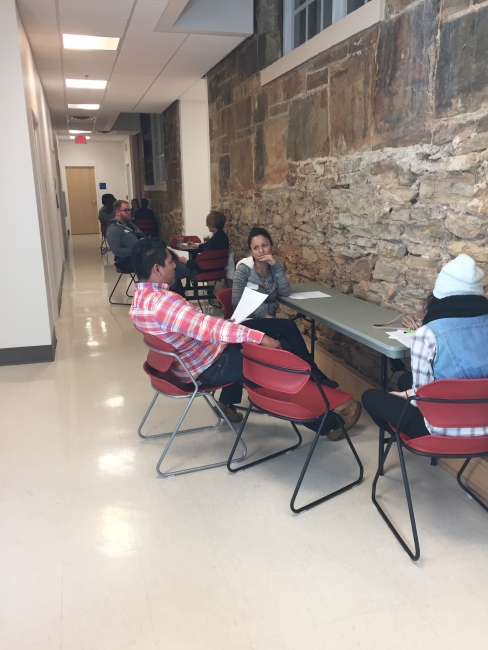You have /5 articles left.
Sign up for a free account or log in.

Students discuss what they have learned in a session on soft skills.
Reinhardt University
Reinhardt University, a small liberal arts college in Georgia, is piloting a program aimed at cultivating students’ soft skills and giving them an edge over their peers in the job market -- without changing the liberal arts curriculum that is the center of formal education there.
Similar to digital badges, which about one in five colleges have adopted as a form of alternative credentialing, Reinhardt’s new program seeks to quantify skills and reward those who have picked them up outside traditional college courses.
Reinhardt’s program, the Strategic Career Advantage Platform (S-CAP), was launched in fall 2016. Each month, the college offers a Saturday session focused on a different topic -- for example, one four-hour January session focused on emotional intelligence. Others so far have covered impression management, listening and mediation.
At the end of the session, the students are not tested on the material. Instead, they write and reflect on what they learned and how they could realistically communicate that to an employer, said Reinhardt President Kina Mallard. The idea is for students to recognize real-life scenarios in which they have used those soft skills -- such as conflict resolution, mediation and listening -- and to then highlight that on their résumés or in job interviews.
For every five sessions students complete, they will receive a pin to wear on their graduation gowns, marking the achievement.
Mallard said one of the problems with digital badges and electronic portfolios, which provide a single place for students to showcase their skills and accomplishments, is they rely on employers to do part of the work of figuring out what the credentials mean. S-CAP places the responsibility on its students.
“It’s not incumbent on the employer to research and understand the skills [our graduates] have,” Mallard said. “It’s incumbent on the employee.”
Mallard had the idea for S-CAP, part of a broader “enrollment to employment” initiative at the university, when she joined Reinhardt about a year and a half ago. Because Reinhardt is small -- about 1,400 students are enrolled -- and focuses on building student-faculty relationships, Mallard thought students would benefit more from the S-CAP design. “Students need a comprehensive career development program that starts at freshman year and goes all the way through,” she said, adding that getting a job is different from getting the right job.
S-CAP, however, is new and untested. Administrators still don’t know how employers will take to it, but Peggy Collins Feehery, director of career services at Reinhardt, will work with students throughout the year to turn the information from those sessions into résumé material and concrete talking points. A large component of this will involve mock interviews.
“I do think it will set our students apart,” Collins Feehery said, “and that’s exactly what we’re trying to do.”
As with other soft-skills training programs, S-CAP has some critics.
Colin Mathews is president and founder of Merit, a business that sells colleges platforms on which students can document honors, awards and out-of-class experiences that are relevant to future employment. He says soft skills are synonymous with life skills, and employers don’t need certificates, pins or badges to recognize which students possess the right set of life skills.
For example, employers like to hire athletes, Mathews said, because they know those students are disciplined, focused and able to balance a demanding schedule. They also like to hire students who hold down part-time jobs during the school year and first-generation college students, because those students are bold, tenacious and hardworking. The same life skills Reinhardt is trying to teach through S-CAP, Mathews said, are skills employers have been able to identify in their applicants for decades.
“That’s why badging has totally failed,” Mathews said. “They’re trying to invent a whole new language and have badges to communicate that language … but nobody cares.”
It’s important that colleges find a way to communicate to employers that a degree from their school is valuable, Mathews said, but hosting these makeshift classes is not the right way to do it.
Amber Garrison Duncan, a strategy director at the Lumina Foundation, said S-CAP is flawed because it’s missing an effective digital format.
“The digital part is becoming more critical,” Garrison Duncan, said, adding that electronic portfolios, which can be clicked on and read through, are helpful to employers during the screening process.
She said she often hears employers say they don’t care how students learned the skill -- whether it was through an academic course, an internship or another life experience -- they just care that the students have it at all.
“I think [S-CAP] is a great step in the right direction, and certainly we know what the potential is here for the learner,” Garrison Duncan said. “I would just encourage them … to continue to develop their program.”
That’s the plan for Reinhardt. At this stage, they’re “not billing it as more than it is,” Mallard said, but hoping to use this pilot as a way to understand what skills students lack and how they can best prepare them for their postgraduate endeavors.







